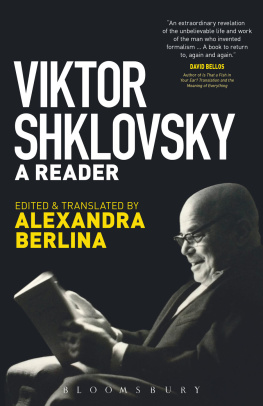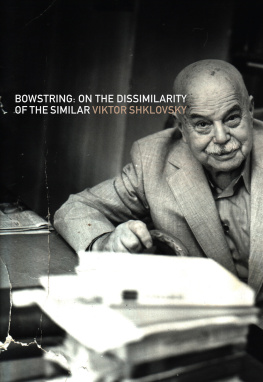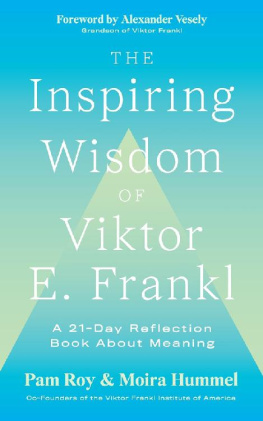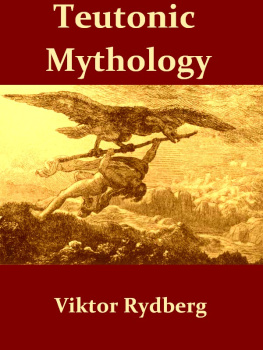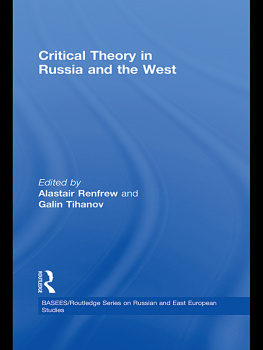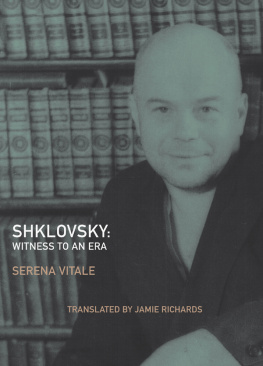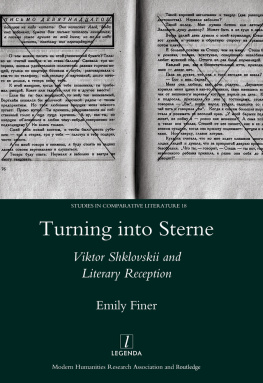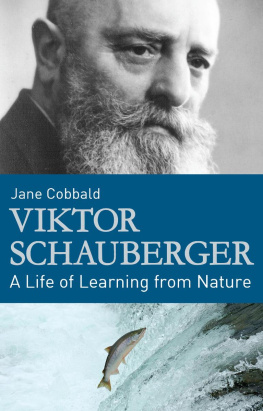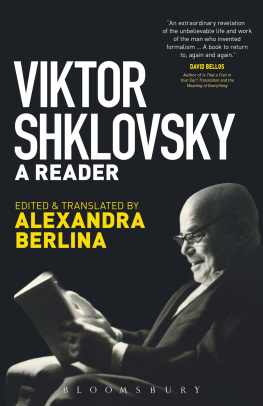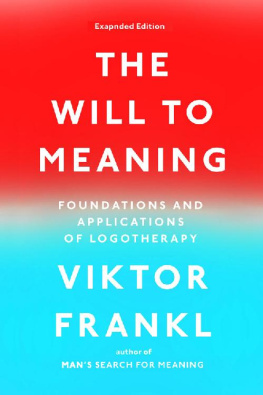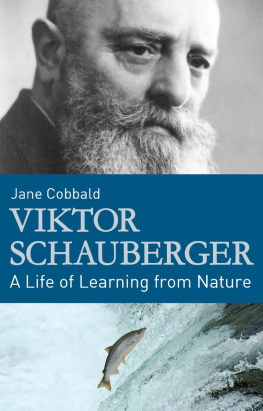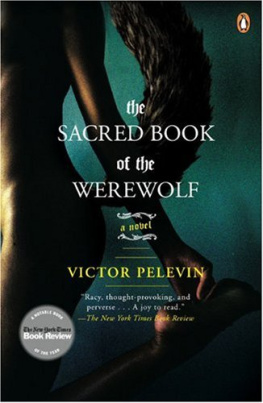Viktor Shklovsky
Viktor Shklovsky
A Reader
Edited and Translated by
Alexandra Berlina

Bloomsbury Academic
An imprint of Bloomsbury Publishing Inc
Contents
I am deeply grateful to the Prokhorov Fund for supporting this translation, and to Viktor Shklovskys grandson, Nikita Shklovsky, for providing priceless information as well as the cover image. Many thanks to Kevin M. F. Platt, Serguei Oushakine, Haun Saussy and Holt Meyer for their interest and input.
The well bred contradict other people. The wise contradict themselves.
OSCAR WILDE
PHRASES AND PHILOSOPHIES FOR THE USE OF THE YOUNG (C. 1894)
Give us new forms!
a scream resounds through all things.
VLADIMIR MAYAKOVSKY
ORDER NO. 2 TO THE ARMY OF THE ARTS (1921)
Let me begin by explaining the epigraphs. Shklovsky loved Wildes writing as a teenager and was himself a master of the aphorism; in his twenties, he became a friend of Mayakovsky and a champion of his work. However, this is not the main reason for placing these lines so prominently; rather, they sum up much of what is crucial about Shklovsky. If Wilde is right, Shklovsky was both well-bred and wise: he constantly contradicted other people, and also himself. His insistence on the importance of form stood in contrast both to classical Russian criticism and to the ideological Soviet approach.His grandson Nikita Shklovsky, who answered my queries with great patience, believes that his grandfather actively provoked people in order to make them listen. He goes on to say that Shklovsky only ever claimed that content didnt matter in order to turn the listeners nose in his direction and to shake the dust off his ears. Studying form and artistic devices was Shklovskys life work but contradicting established opinions was to him a pleasure in itself.
Disagreeing with authorities is only natural in a gifted young scholar, but Shklovsky went further. He, and other members of the Society for the Study of Poetic Language known as the OPOYAZ, also enjoyed passionately contradicting each other. More importantly still, Shklovsky was never shy of contradicting himself. One might well argue that not doing so in seventy years of scholarship would be stagnation. One of Shklovskys closest friends and most perceptive commentators, Alexander Chudakov, observes: The primary trait of Shklovskys thinking [] is its indispensable polemic quality, be it external or internal. Shklovskys famous aphorisms, which have been quoted many thousand times, always contain not and but (Dva pervykh : 31).
For Shklovsky, contradiction is both a device of Aesopian language in his (semi-)retractions of formalist heritage and a method of thinking. In Hamburg Score , he explains that he arranges his shelves so that neighboring books contradict each other (of Shklovskys retractions, such as A Monument to a Scholarly Mistake (1930), were simply a matter of self-protection, though even these might bear traces of hidden irony (cf. Boym, Poetics and Politics 597). However, often, when Shklovsky contradicts or appears to contradict himself, we are actually watching him think.
Let us now turn to the second epigraph. By 1921, Mayakovsky knew and appreciated Shklovsky. It is quite probable that Order No. 2 to the Army of the Arts is referencing Resurrecting the Word and Art as Device. The two lines cited here not only describe what became Shklovskys most influential idea; they do so using two of his crucial keywords. Things ( veshchi ) must be given new forms ( formy ) in order to become seen, and not merely automatically recognized. When talking of things in need of formal renewal, Shklovsky can refer to literary language, genres, and conventions (in fact, veshchi can also mean texts), but also to the objects (including people, feelings, and customs) described and depicted in art. Shklovskys first essay, Resurrecting the Word, emphasizes the former, intraliterary aspect. His best-known text, Art as Devicethe manifesto of the formal method (Eikhenbaum, of renewing our experience of things by changing their forms, throughout his life.
He spent seventy years writing theory, criticism, and fiction, be it under enemy fire or merely the salvos of his critics. Navigating through his immense and fascinating body of work is a challenge. Things are not made easier by the existence of nonidentical twins among his books. On the Theory of Prose , published in 1983, includes some material from On the Theory of Prose published in 1925, but nine out of eleven main chapters are completely different. The same is true for Hamburg Score (1990) and its 1928 namesake. The present reader provides an overview, and this is one reason for its existence. Another reason is that more than half of the material excerpted here Technique of Writing Craft (1927), Hamburg Score (1928), Once Upon a Time (1964), Tales about Prose (1966), On the Theory of Prose (1983), as well as most articles on cinema and lettershas never been translated into English before.
When Shklovsky says, in Once Upon a Time , that his books werent written with the quiet consistency of academic works, this is rather an understatement. Shklovsky wrote while fighting in the First World War, participating in the February Revolution, and trying to stage an anti-Bolshevik coup. He wrote while hiding in a mental ward and while starving in Petrograd. He wrote while in hospital, almost shredded by a bomb, and while torn between an unrelenting love object in Berlin and an imprisoned wife in Russia. Originally, the structure of this reader was meant to pair scholarship with autobiographical writing dedicated to that time. However, soon it became clear how wrong any attempt to separate Shklovskys scholarly, autobiographical, and fictional writing would be: this would mean cutting texts into pieces.
In revolutionary times, many things became intermixed, including genres. Shklovsky was not the only Russian writer working outside of the usual categories. He himself cited Dantes Vita Nova as an example of a text which combines meditations on the theory of art with memories and poems ( Tetiva 160). When looking for a comparable contemporary work, Ali Smiths Artful comes to mind. Still, among scholarly writing of his time, his texts were the most daring crossbreeds. Trying to neatly structure them is counterproductive.
But precisely this hybridity makes it helpful to know what was happening to Shklovsky while a particular text was written. Difficult as it is to condense his extraordinary life into a timeline, here is an attempt to do so. A bibliography of Shklovskys work published eight years before his death takes up 85 pages (Sheldon, Viktor Shklovsky ). The following short biography includes only a very small selection of Shklovskys writings.
1893 (January 25): Viktor is born in St. Petersburg to the math teacher Boris Shklovsky and his wife Varvara (ne Bundel).
1908: Shklovskys short story The Right to Grieve is published in the magazine Vesna ; he is fifteen. In the same year, he is expelled from school (and accepted at another).
1912: Shklovsky enters the Philological Faculty of Petersburg University, where he studies for a year and a half (he never receives a higher education diploma).
191314: Shklovsky gives talks in literary cafes and schools, most famously on The Place of Futurism in Language History and Resurrecting the Word. The group of philologists which is to become the OPOYAZ begins to condense around Shklovsky. In 1914, he publishes Resurrecting the Word and a poetry collection, The Lot of Lead .

